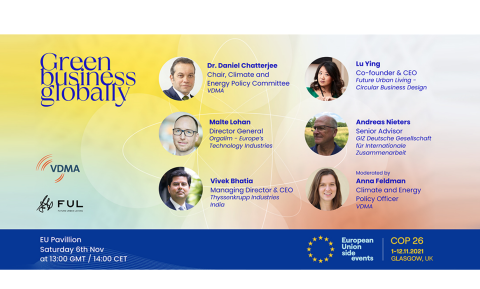Orgalim at COP26: green technology solutions for climate friendly business
9 November 2021

Technology can offer concrete and innovative solutions to climate change. This statement was core to the COP26 session "Green business globally: green technology solutions for climate friendly and circular business design", hosted at the EU pavilion by our member VDMA. During the panel, our Director General Malte Lohan offered the European technology industries’ perspective, providing three key solutions to overcome the barriers that still prevent the full deployment of our technologies.
-
Incentivise carbon reduction. Less than a quarter of global greenhouse gas emissions are covered by carbon pricing initiatives. Mr. Lohan outlined how carbon has a climate cost and therefore needs a meaningful price that rewards clean technology innovation and deployment. Article 6 of the Paris Agreement “can establish a policy foundation for a stable and predictable investment environment, which could ultimately help lead to a global price on carbon”, he said. This cooperation mechanism, if properly designed, should make it easier to achieve reduction targets and raise ambition.
-
Recognise technology as key enabler for the green transition. According to a VDMA and Boston Consulting Groups study, our technologies can prevent more than 80% of the greenhouse gas emissions from industry. However, the enabling role of Europe’s technology industries has not been fully recognised in the current Sustainable Finance framework, as already highlighted by Orgalim. The main concern is that if the EU Sustainable Finance framework fails to capture the role of our industries in the green transition, the EU ambition to become carbon neutral will simply not be achieved.
-
The new Circular Economy Action Plan and Sustainable Products Initiative (SPI). Mr Lohan also pointed out the importance of the new Circular Economy Action Plan and its upcoming Sustainable Products Initiative to further optimise the way resources are used. The SPI is an important opportunity for a win-win for both the environment and the economy.
Our technologies are at the heart of global efforts to address the climate emergency. We need the right policy and regulatory environment to incentivise investments and a global common Sustainable Finance framework.
All the speakers agreed on one key message: climate action is both a challenge and an opportunity for businesses. The moderator Anna Feldman closed the session by asking all panellists for their one priority for shifting towards a model of green business globally. Andreas Nieters, Senior Advisor of GIZ, underlined the importance of providing the right regulatory framework to support green technologies, while the CEO of Thyssenkrupp India Vivek Bathia stressed the urgency to focus on action rather than perfection. Future Urban Living’s CEO Lu Ying focused on the need for an aligned and coordinated action at a global level, while Dr Daniel Chatterjee, Chair of Climate and Energy Policy Committee at VDMA, drew the attention to one of the most challenging aspects of the green transition: ensuring for efficiency and climate action to go hand in hand.
Orgalim's complete positions and recommendations on the EU Sustainable Finance Framework, the new Circular Economy Plan and Sustainable Products Initiative and other related regulatory dossiers can be found here.
If you missed the session, you can access the recording here.

LATEST NEWS
How can we create a dynamic, competitive European high-tech manufacturing base?
Orgalim's key recommendations offer policymake...
